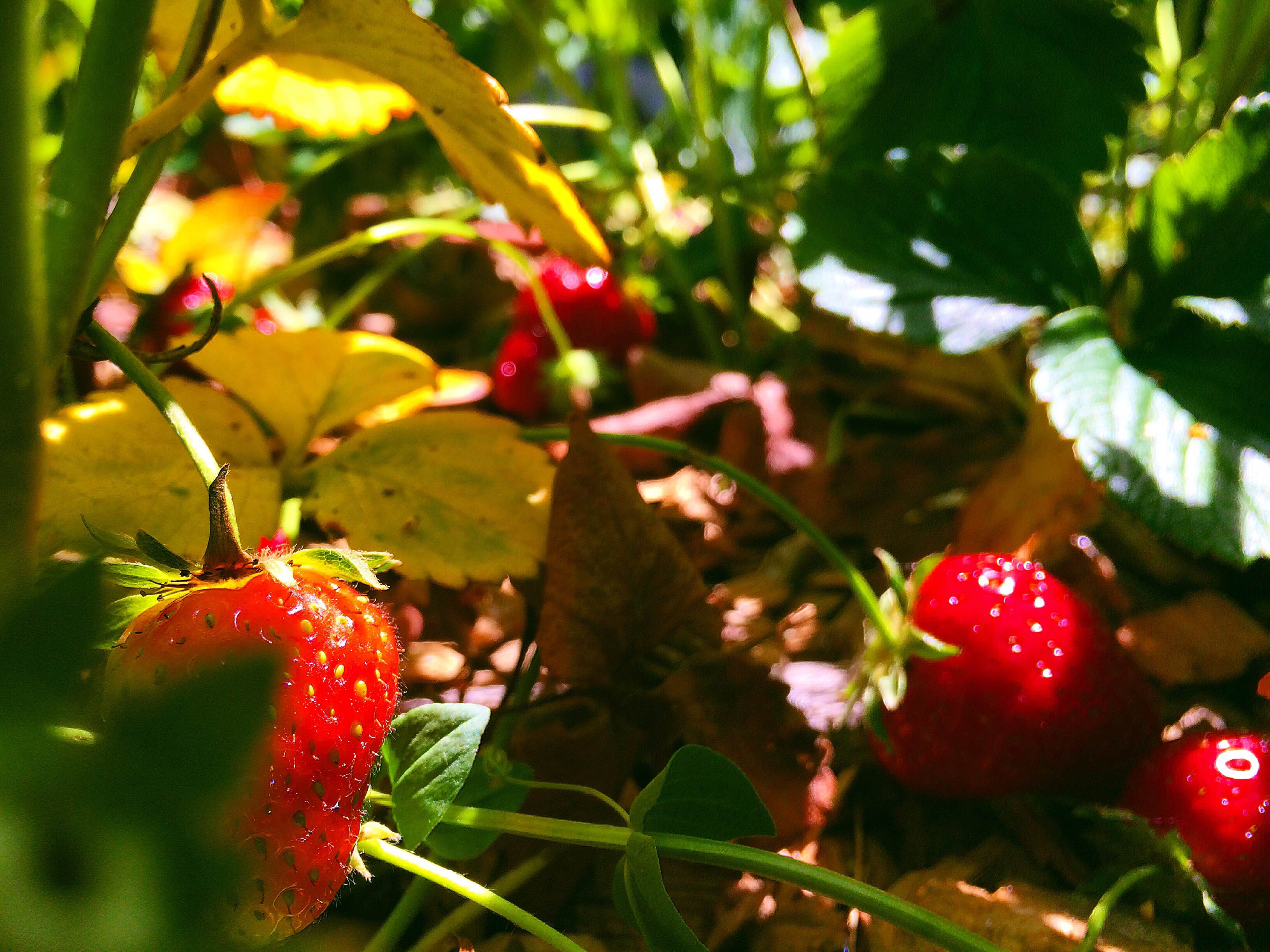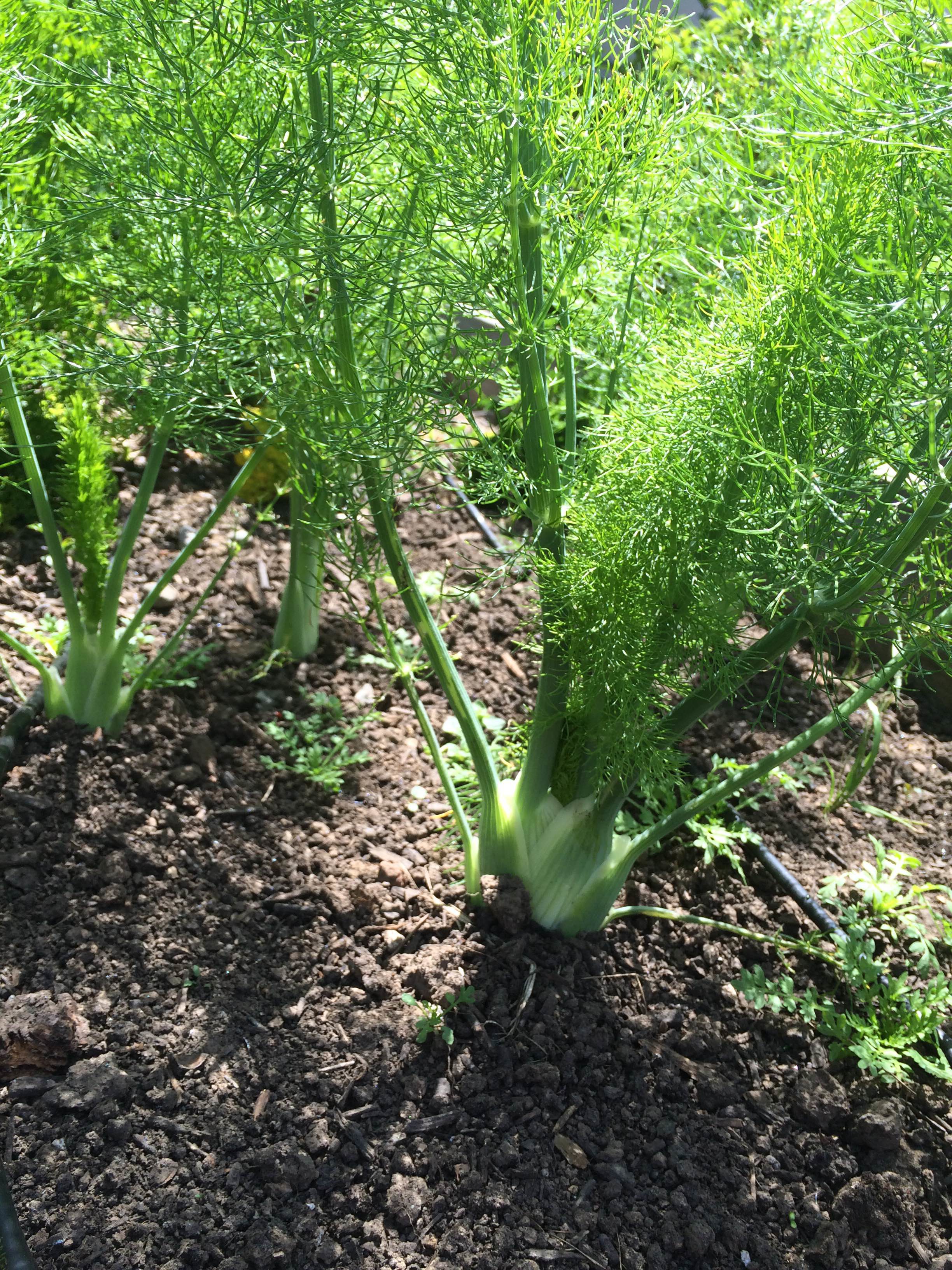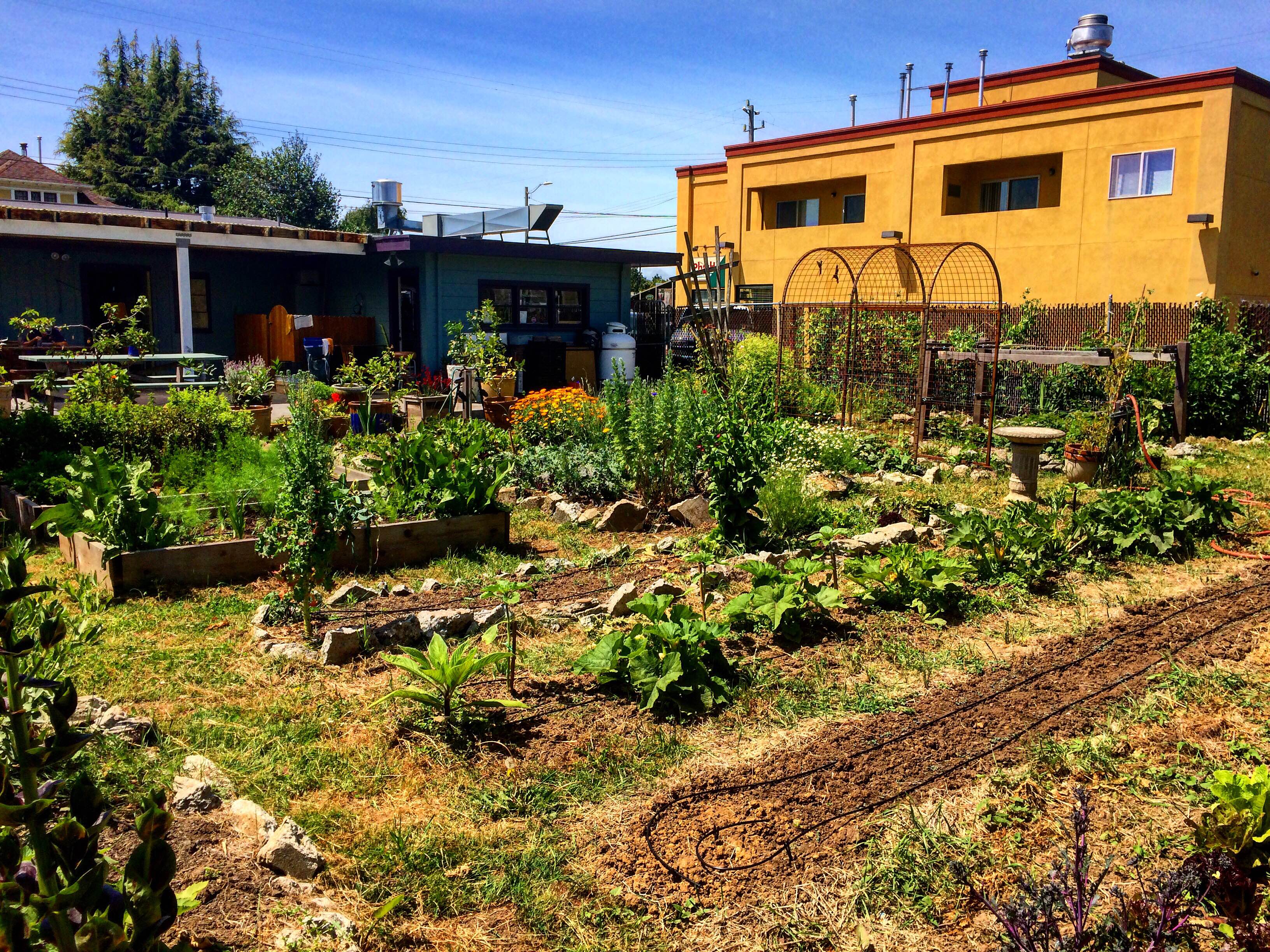Last week my boyfriend, Ian, his sister, Rhianna, and I took a road trip to one of our favorite places on Earth: Arcata, CA. We all used to live there. Ian for three years, Rhianna and me for one. As per usual, I had the most magical, inspiring time there last week.
Let me set the scene for you.

Imagine waking up every morning to the excitement of knowing a luscious farm is waiting just outside your window! Full of sweet, crisp carrots, succulent strawberries, and the friendliest herd of goats you’ve ever encountered. Yes, you read correctly, I said goats. Sweet, sweet loving goats that let you feed them and nuzzle up to you. I realize now when I say “the friendliest goats you’ve ever encountered” that perhaps you have never encountered goats. I suggest you hop on the bandwagon kids, because you are missing out big time! Have you seen that episode of Modern Family where Gloria and Jay’s kid befriends a goat? Cutest thing ever. Nuff said.
Anyway, let me tell you why I took this very special road trip!!! As you may already know, a large part of this website is the interviews I conduct with ethical businesses and experts of sustainability. The interviews are there so we can all better understand various ethical topics. As the saying goes, knowledge is power! Arcata California is a model city setting the standard for what the global community should be focusing on. The businesses set an excellent example for us to learn how to sustain life for generations to come.
This post however, is about one specific, very special farm-to-table locally sourced restaurant I interviewed: Café Phoenix. The owners Conny Peña and Breon Hole source almost all of their ingredients locally. Basically every ingredient, (except avocado and bananas, which don’t grow in the region), come from local, humane family farms. Their menu changes everyday to reflect what is in season and at a reasonable price for their customers. There food is nutritious, literally as fresh as it gets and made with love and considerable thought. However, the coolest aspect of their restaurant is the back patio area where they grow most of restaurant’s organic vegetables.


HOW FANTASTIC IS THAT?!….?!?!?!?!!!!!!!!!!!!!
When I said the food you get there is literally as fresh as it gets, I wasn’t kidding. This is the wave of the future folks. Nothing beats the fresh taste of homegrown food made from scratch coupled with the convenience of not making it yourself. Hallelujah. Not only that, but Café Phoenix shares your ethical concerns. You can trust them instead of feeling obligated to ask questions about where they source the food. Everything thought out, from the food, to the environmental impact of the business, to employee treatment and waste limitation.
The two owners of Café Phoenix, Conny and Breon, were kind enough to sit down with me. We discussed the importance of sustainability and their locally sourced restaurant. Plus, what we as consumers can do to make a positive impact on the world. Below are highlights from the interview. They beautifully put into words concepts that I often struggle to explain eloquently. I was honored to talk with them. Both so entrenched and passionate about their careers.
*Disclaimer: Some of this content is paraphrased for clarity purposes. However, most of the interview below is composed of direct quotes from Conny and Breon.*
Interview at Café Phoenix:
Q: Did you plan on growing food for the restaurant? Or because of this space specifically you decided to start a garden?
Conny: Based on the space. Prior to learning about this space through a friend, I was about to sign a lease for a juice bar, which would not allow the space for a full kitchen. I would not have been able to do a full service restaurant. So when this place came along I didn’t even really want to look at it, but eventually I came and Breon met me here. As soon as we opened the back door and saw what was here it was kind of like, “Wow!”. The garden supplies us with a lot. Not everything, but a good amount and we pick from it on a daily basis. So it’s really nice to have that to branch into!
Q: What do you grow back there?
Breon: Right now I’ve got a bunch of strawberries and peas. The zucchini is starting to go off too. Herbs, we’ve got more herbs than we know what to do with! So we do a lot of dressings and pesto. We also make our own tea blends so we can add verbena, peppermint or nettles. The green beans are starting to come up; I have some berries that are starting to set on and beets and kale. So that’s kind of right now. It can ebb and flow a little bit depending on the season.
Q: How do you manage to source everything locally and sustainably? Is there anything that you don’t source locally?
Conny: There are some things. Like for the smoothies the bananas are obviously not local and avocados don’t come from here. But really there’s not a whole lot we can’t get from here. It definitely gets harder in the winter so we focus more on the grains and the greens; stuff like that. However, we do have to branch out a little bit just so that the menu can vary to some degree. But we can probably count on two hands the number of things we don’t get locally, so I think that says a lot about a restaurant and what we are able to do here.
Q: Do you think your ability to source locally is unique to the area because Arcata is so conscious and forward thinking about sustainability and organic agriculture or do you think it is something any restaurant owner can do?
Conny: I definitely think it needs embracing a little bit more on a local level. I think we are unique. People are a little more forward thinking here with regards to sustainability. Our goal was to create a role model for what can come out of here. Luckily we live in an area where there is an abundance of stuff.
Breon: Yeah, the climate up here really allows for a lot of food production. It always shocks me how few restaurants actually get food from here, because of the availibility. That’s a part of the experiment too, because for us it can get very expensive. It still costs a lot for the farmers to grow the food as well as a lot of time so then to put that out on the plates costs us a lot. You know, we still both work night jobs just trying to make ends meet, so it’s an experiment of the concept of eating farm to table and the reality of what that takes.
Conny: Unfortunately, it’s not always economical for a restaurant to source locally and I’m hoping that changes over time, but if we were really to put a price point on what our menu is costing us, most people won’t pay. Unfortunately, there is a good amount of people who don’t branch into or really look into what they are eating. It’s hard to educate and it’s hard to appeal to the mainstream. It’s a unique business in that regard, it can be really hard to stick to our guns with it, and buying local can definitely throw a wrench in our plans. It varies with the seasons. So we have to fluctuate constantly. A changing menu makes that feasible, but not easy.
Q: In our culture many people are really far removed from where their food comes from. It’s not necessarily that they don’t care, but they don’t do the research for various reasons. How do you get people pay a couple of dollars more to get something that is fresh and local? What can you do if you want to transition your restaurant or open one more locally focused in an area not as conscientious as Arcata, CA?
Conny: A big part of it is educating the employees, because there are people who will complain a little bit about the price point. As long as there is some point of understanding on the employees part they can give the customer factual information about where it came from and what’s going into the process. I mean it’s a quick serve so we can’t talk a person’s ears off to sell them any one thing, but we are also at a point where they are going to want it or they are not. Ya know? So we are going to appeal to them or we are not and hopefully our culture will develop a more open-minded point of view, but we are just trying to make the food as good as it can possibly be so that people want to come back again.
Q: Where do you get your meat from?
Breon: I work with a lot of farmers. Anyone who is going to be at the Farmer’s market I talk with. I communicate with a lot of farms that also don’t sell there as well. We try to have a diversity as far as talking to people and seeing what is available. That way when things are more abundant the price bracket is better as well. So if it is in abundance we are able to share it. Everywhere from Shake Fork Farms to Sevinski Farms, Organic Matters Ranch.
We’ve even had someone raise chickens for us on the terms that I help them slaughter the chickens. With chickens and rabbits and poultry you can use a commercial facility and legally process your own animals. Whereas with larger animals you have to take them to a processing plant so we have to buy from the farmer’s market which gets fairly expensive. We try to have smaller meat portions and we have been trying to use every part of the animal like in Latin America.
Q: What does Café Phoenix do to minimize their waste?
Conny: You know, I’ve been really impressed with how Café Phoenix has more recycling and compost then it does trash. More often than not when I’m taking the trash out once a week there is only one can of trash and two full recycling bins, and we have compost picked up everyday to feed pigs or whatever. So the biggest challenge is to-go stuff. There is really no way around it and people want it. We use paper and biodegradable as much as we can, but it is still not our favorite.
Q: What do you want people to take away from their experience with they eat at Café Phoenix?
Breon: Eating local and eating good food doesn’t have to be so bourgeois. It’s become so class oriented and bourgey to have a local salad. It’s crazy to me to see greens and kale that are being shipped up from central valley and then when it’s local it is this big deal, but really kale grows like a weed up here. I want to show people that eating local doesn’t have to be such a big deal.
Conny: When I decided to open another restaurant my thought process was really I just want to take the thinking out of what people are eating. I don’t want customer’s to have to worry about where their food is coming from or if it is good or organic. I just wanted to eliminate all of that process so that people know whatever they are ordering it is quality, well sourced and thought out. That was always my goal in opening another restaurant. Have a good meal and know that it came from at least a 200 mile radius. Plus, feel good about it when you leave. Especially in regards to meat. You don’t know where that animal came from or what it had to go through when you get a hamburger.
Breon: Sometimes people ask us if we are a vegetarian restaurant and we aren’t, but sometimes we might not have meat on our menu for 4 to 5 days in a row, because we are working on sourcing it and it takes time. We also want to find something that isn’t too overly expensive for the consumer so we have to consider that and factor in how much is available, what is available and what we can do with it. Having traveled around the world I’ve seen that it is common to have just a few things on the menu, because that is what is available or that is what they have in their backyard that day so we try to mirror that.
Q: What is one simple thing that consumers and restaurant owners could start doing today that would impact consumer culture in a sustainable way?
Conny: I would have to say that they would have to think locally and in a broader sense, not just in regards to food but in general. If we can focus on our local economy there is so much there. Granted we are spoiled here, but I don’t think we are unique in what we are able to produce. I know there are areas where that kind of agriculture doesn’t exist, but even a family being able to grow their own food as opposed to having a lawn; that’s a huge difference. I’m spoiled in having friends that are farmers and a CSA on top of this place.
I am from southern California and when I talk to my family about what we are growing and getting up here they don’t even know of half of the vegetables I work with, or what you can do with them, or how to prepare them. It opens up a whole other realm of cooking, and it’s not just vegetarian, but you learn a lot about yourself, what your appetite wants and how the seasons relates to how your body functions.
It just makes so much more sense when you can focus on what is able to grow in this area. It’s a really simple fix and I’m not sure why people are more concerned on having these pristine lawns. Even for a family of four it makes a huge difference to not have to go out and buy organic produce. It’s not to say that we shouldn’t be buying organic, we should, but growing your own food is so empowering and educational in a huge way.
Breon: I have to agree along the same scope. Becoming aware, thinking about the bigger picture. Being able to see and learn how something grows and what natively grows in your area. To start thinking about where all of our things are coming from. I think opening that spectrum is what is going to allow us to make the changes.
I can get overwhelmed by the topic easily. Sometimes I feel like there is no way we are going to make it out of this or make a difference, but my cousin said something to me a few years back that was really helpful. He said, “Start with what you know”. I have to remind myself of that regularly, even in my farming practices where I would love to be producing my own till and making my own nutrients for this and that but sometimes you have to start with what is realistic and what you know. I feel a lot of people get overwhelmed even with the idea of doing a planter box, but I believe it is inherently imbedded in us.
Putting our hands in the dirt and watching food grow, even if you mess it up you learn something from it. I think that we all instinctively know more about plants than we realize, like when something is healthy and when it is not. Just start planning with that, you know. Even if it is a box with some parsley plants in your front lawn so you can have fresh parsley on your salads. I’ve lived in places where I had a yard that didn’t get enough sun so I put a kitty pool on the roof with some soil and plants. There are options, just be aware and ask questions. It’s time to start thinking about the changes we would like to see for ourselves and our kids.
Contact:
Café Phoenix needs all the support they can get! Please go and like their Facebook page to show some love. They are supporting local industries by sourcing locally. You can support your local economy too just by supporting businesses like them. The more we shop at places like Café Phoenix the more of a space they will have to thrive. And we will see more businesses like them spring up. So don’t forget every time you spend a dollar, it is a vote for what you want to see in our communities. And if you are ever in Arcata, CA definitely stop for a bite at Café Phoenix; it’s a really special place.

